A SCRAPBOOK OF RACIST HORROR

MANHATTAN BEACH, CA -JULY 29, 2020: A memorial to Emmett Till, is located in front of a commemorative plaque at Bruces Beach, a park located in Manhattan Beach. Till was a 14-year-old African American who was lynched in Mississippi in 1955. Bruces Beach used to be owned by one of the first prominent Black oceanfront homeowners (in the 1920s) but Manhattan Beach ran them out of town and erased/rewrote the history of what happened. A new generation of residents is now calling on the city to confront its racist past. Many have reclaimed the space in recent weeks to celebrate and honor the Black Lives Matter movement. (Mel Melcon / Los Angeles Times via Getty Images)

The scenery of Tallahatchie River where Emmett Till’s body was found in Money, Mississippi, United States, 1955 (Photo by Ed Clark/The LIFE Picture Collection via Getty Images)

Sheriff Clarence Strider (1904 – 1970) examines a gin fan during the trial of J W Milam and Roy Bryant, Sumner, Mississippi. September 1955. Milam and Bryant were accused of murdering Emmett Till, a 14-year-old African-American boy from Chicago who had allegedly flirted with Bryant’s wife and sank his body in the Tallahatchie River with a gin fan tied to him with barbed wire. (Photo by Ed Clark/The LIFE Picture Collection via Getty Images) Description: Gin fan tied to Emmett Till before he was murdered was used as evidence during the trial. [JB: not totally sure if this is THE fan or just A fan. Captions are unspecific. Also, is this Clarence Strider?] City: Sumner State: MS Country: US cr: Ed Clark/The LIFE Picture Collection via Getty Images) OWNED.
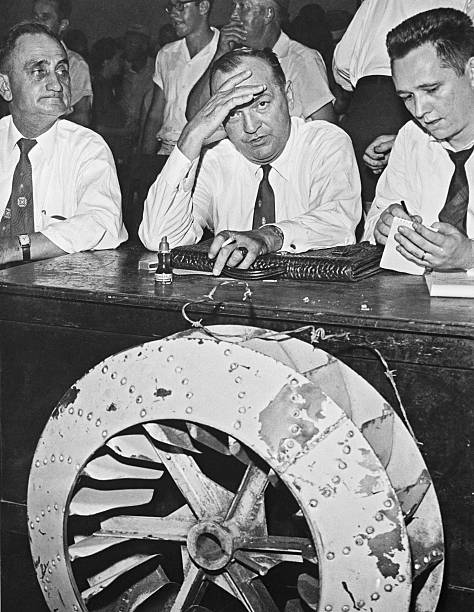
Prosecutors show the wheel used to weigh down the body of the Emment TIll.
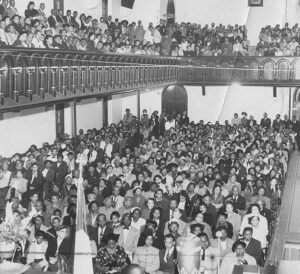
African American community gathers for the Emmett Till protest at Sharp St Church, in 1955. (Photo by Afro American Newspapers/Gado/Getty Images)

Chicago: Mourners and curiosity seekers flock around the entrance to Roberts Temple Church of God in Christ here during funeral services for Emmett Till, 14, a Chicago boy slain in Mississippi recently while on vacation. Till, a Negro, was kidnapped by two White men and later found slain, after he reportedly whistled at a White woman in Greenwood, Miss. About 50,000 persons viewed the body at the chapel here in late September 2 and early September 3.
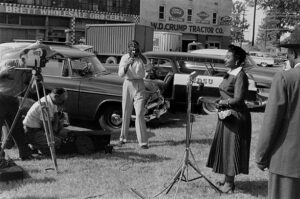
Emmett Till’s mother Mamie Bradley speaks to the press after her son’s kidnapping and murder. (Photo By Ed Clark/The LIFE Picture Collection via Getty Images)

Mother of “Whistle” Murder Victim Meets the Press. Sumner, Mississippi: Mrs. Mamie Bradley, mother of Emmett Louis Till, the 14-year-old Negro boy for whose murder two White men are on trial at Sumner, is shown talking to reporters after her appearance at the trial today caused so much furor that a recess was called. Mrs. Bradley flew from Chicago to be present at the trial of Roy Bryant and J.W. Milam, who are accused of killing her son because he “wolf-whistled” at Bryant’s wife.
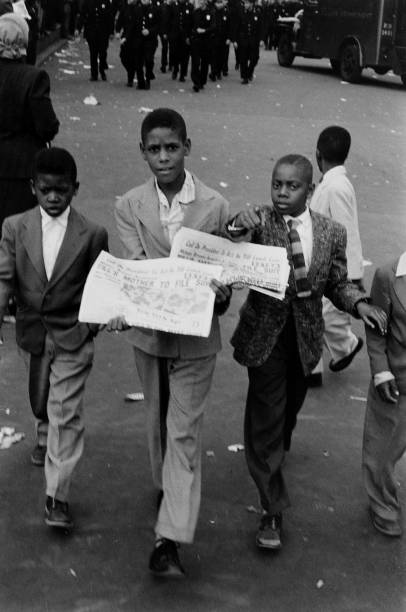
Children holding newspaper during the anti-lunching rally after the acquittal of men accused of killing Emmett Till, Harlem, New York City, New York, 1955 (Photo by Grey Villet/The LIFE Picture Collection via Getty Images)
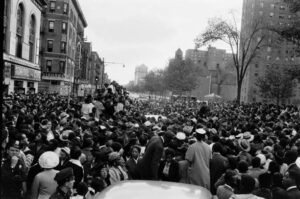
People gathering during the anti-lynching rally after the acquittal of men accused of killing Emmett Till, Harlem, New York City, New York, 1955 (Photo by Grey Villet/The LIFE Picture Collection via Getty Images)
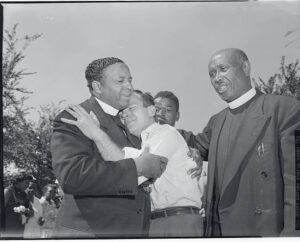
Collapses at Funeral. Chicago: Luke Ward (center), junior pastor and theology student in Church of God in Christ, is comforted by Bishop H.M. Hooper of Risen Holy Nazarene Church (left) after Ward broke down at the funeral of Emmett Till, 14-year-old Negro youth found murdered in Greenwood, Miss. The pastor at right is unidentified.
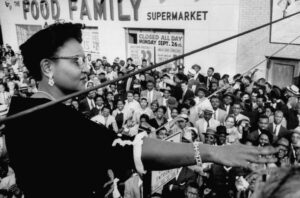
Mamie Bradley (L) spoke to an anti-lynching rally after the acquittal of the men accused of killing her son, Emmett Till. (Photo by Grey Villet/The LIFE Picture Collection via Getty Images)
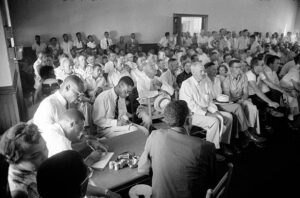
Interior view of the segregated seating in the packed Tallahatchie County Courthouse during the trial of J W Milam and Roy Bryant who were accused of the murder of Emmett Till, Sumner, Mississippi, September 1955. Till was a 14-year-old African-American boy from Chicago who had allegedly flirted with Bryant’s wife, a white woman. Photojournalist Ernest Withers of the Chicago Defender is seated in the center foreground with his back to the camera. (Photo by Ed Clark/The LIFE Picture Collection via Getty Images) Ernest Withers (back to camera).
No problem – The Tallahatchie Court fixed was in…
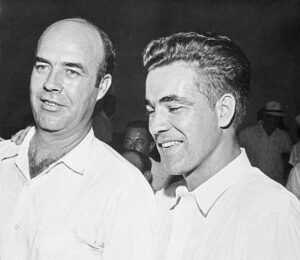
J.W. Milam (left) and his half-brother, Roy Bryant (right) were acquitted today in the Emmett Louis Till murder trial. The two still face a kidnapping charge in nearby Leflore Co. Mississippi. This comes up next November at Greenwood, MS.
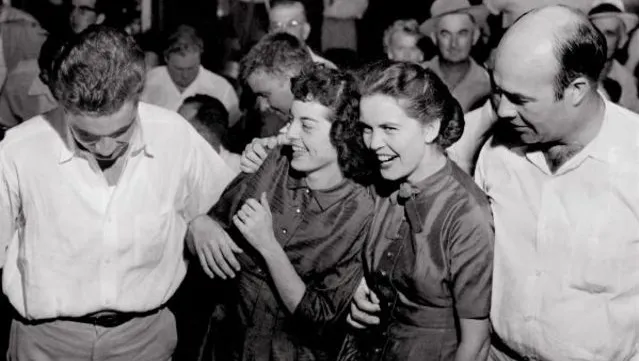
Confession
“When they were acquitted, the men later sold their story for $4,000 to reporter William Bradford Huie. Two of their defense attorneys helped facilitate the interview that was published in Look magazine in January 1956. After the town’s show of support at the trial, the men talked freely about how they killed the young teen from Chicago. But soon after the article came out, both men were ostracized.”
A Revealing Interview
John Whitten, one of their defense attorneys, told National Public Radio’s Soundprint program in a 1994 interview that he later regretted defending the case. “I’m not proud of it,” Whitten said. “I wished I had never been associated with it.“
Roy Bryant was also interviewed for the same Soundprint program. Legally blind and plagued with back trouble, he refused to talk about the case. Even though he was protected by double jeopardy, he still feared he would have to pay for his crime before he died.

“Let that goddamn stuff die,” Bryant said. “Look what they done with Beckwith. And now they want to get me, well, to hell with them. I’m not gon’ talk about it. Can’t ever tell what they might do nowadays, they might change the Constitution.”
(White supremacist Byron de la Beckwith was convicted of murder in 1994, 31 years after assassinating Black NAACP field secretary Medgar Evers.)
Embittered, Roy also claimed that his half-brother J. W. got all the money from the Look deal. “A lot of people made a bunch of money off of this. I ain’t never made a damn nickel.”
In 1981, Milam died of cancer of the bone. In August 1994, shortly after the Soundprint interview, Roy Bryant died of cancer.
No one ever did time for Emmett Till’s murder.
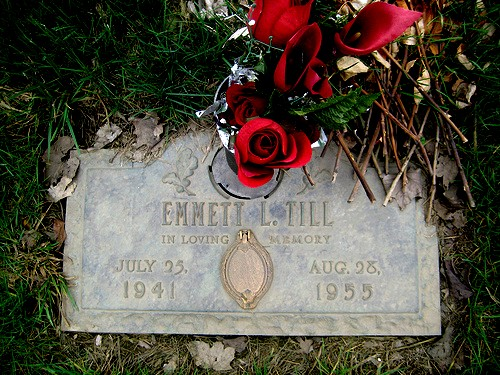
Part III: The Changes of Life after Emmett Till
After the trial, Moses Wright with his family moved out of Mississippi due to the fear for his own safety. He never came back until passing away in 1960. Bryant with his wife went back to the store but closed soon after. The couple moved to Texas and divorced in 1979. Ryant died in 1990 because of cancer. Milam went back to the farm but suffered a boycott from African Americans refusing to work for him. Milam also moved to Texas and died in 1981.
Mamie Till, the brave mother, continued to teach in Chicago until her retirement in 1978. She became an important figure in the Civil Rights Movement many years after. In 2003, she passed away at age 81. Without her, Emmett Till’s murder would not be the key to “open” Americans’ eyes to see the racism “plague” which was destroying equality among all races. It was a spark in the uprising of civil activism and resistance for African Americans.
Three months after the murder, a remarkable view of racism and human rights happened in December 1955. The turning event was in Montgomery, Alabama. Rosa Parks, the 42-year-old Black woman, refused the offer of her bus driver to give up her seat to a white man. Rosa Parks became a civil activist after this event, and mentioned her original motivation: “I thought about Emmett Till, and I could not go back. My legs and feet were not hurting, that is a stereotype. I paid the same fare as others, and I felt violated.” Rosa Parks’s action became a symbol during the racism protest and created a change in the American point of view on equality.
Emmett Till was one of 40 people listed in the Civil Rights Memorial in Montgomery, Alabama. In 1991, the route in Chicago was named after him. Myrlie Evers, a civil rights activist in the 1960s, shared: “The Emmett Till case was one that shook the foundations of Mississippi-both Black and White, Uh, because of one, with the white community because of the fact that it had become nationally publicized. With us as blacks, because it said, even a child was not safe from racism and, and bigotry and death.”More than 50 years after the death of Emmett Till, Black and White voters rejected prejudices and fears of the past to elect the son of a white woman from Kansas and a black man from Kenya to be the 44th President of the United States – Barack Obama – the first African American President in the U.S history.
On May 10th, 2004, the Department of Justice announced that it was reopening the Till case for further investigation. Following this opportunity, the Emmett Till Unsolved Civil Rights Crime Act of 2007 was introduced in Congress by John Lewis and Kenny Hulshof. “The act had over 50 bipartisan co-sponsors in Congress. The House of Representatives passed it on June 20th, 2007, by a vote of 422 to 2; only Reps. Lynn Westmoreland and Ron Paul voted against it. In the Senate, the act was passed unanimously on September 24th, 2008, and signed into law by President George W. Bush in October”[13] From the investigation group, the FBI also strongly recommended people with information concerning a civil rights era murder to contact them. “The time to come forward is now. If we work together, perhaps we can uncover the truth while there is still a chance to bring the criminals who perpetrated these vile murders to justice.” Looking back at Milam’s horrifying response to people’s response about Emmett Till’s case, the image of the young boy must continue to make something right out of a terrible wrong like racism towards black people as well as minorities in general.
“Two months ago I had a nice apartment in Chicago. I had a good job. I had a son. When something happened to the Negroes in the South I said, ‘That’s their business, not mine.’ Now I know how wrong. I was. The murder of my son has shown me that what happens to any of us, anywhere in the world, had better be the business of us all.” Mamie Till’s words touched the sympathy of many African Americans in the North with a similar thought. The NAACP asked Mamie Till to go across the country spreading the message of her son’s death on racial equality. It was one of the most successful fundraising campaigns the NAACP had ever known. To never forget those dark days for the minorities, especially Black Americans during the 1960s, the murder of Emmett Till must be preserved and studied carefully. During an interview in the course of doing [Eyes on the Prize], Juan Williams – an American journalist and political analyst for Fox News Channel – showed how Emmett Till’s death changed young minds: “It was not only young black people who spoke about Till, but young white people as well, who had the idea that this is someone our age… ‘Well, it’s not that I can’t be the teacher or nurse, but if they kill people, this is serious,’ and those young white people also said, ‘If they are killing people, it’s not just a matter of some folks don’t like colored people, this is horrible, and this can’t be allowed to go on. I’ve got to do something about this.’” After all, the Emmett Till case was a shock to the nation on violence against blacks in the South as well as a legendary story passing on after generations.
